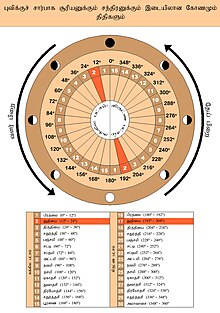
Dvitiya (Sanskrit: द्वितीय, romanized: Dvitīya) also referred to as Beej (Sanskrit: बीज, romanized: Bīja) and Dooj (Sanskrit: दुजा, romanized: Dujā) is the Sanskrit word for "second",[1] and is the second day of the lunar fortnight (Paksha) of the Hindu calendar.[2][3] Each Hindu month has two dvitiya days, being the second day of the "bright" (Shukla) and of the "dark" (Krishna) fortnights respectively. Dvitiya occurs on the second and the seventeenth day of each month.